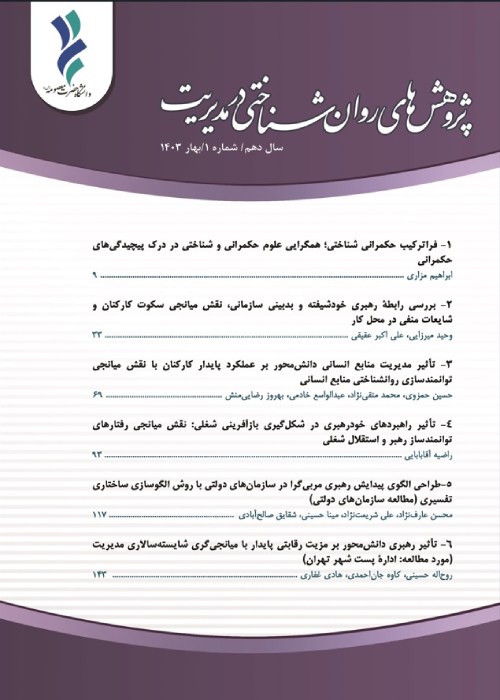Metasynthesis of cognitive governance; convergence of governance and cognitive sciences in understanding the complexities of governance
The current research was conducted with the goal of meta-synthesis of cognitive governance research to understand the complexity of governance through its convergence with neuroscience (brain studies), cognitive (mind studies), and psychology (mind studies). The complexity of governance, on the one hand, and the new and deep understanding of neuroscience, cognitive science, and psychology, especially when humans are active in this complexity, on the other hand, can serve governance by intersecting and merging, which is called cognitive governance. Cognitive governance includes governance over cognition, governance using cognitive sciences, and governance over cognitive sciences, and it is trying, by highlighting the role of cognition, to address the complexities of governance that are caused by the existence of numerous factors and elements and many relationships between them.
Metasynthesis helps to aggregate and analyze scattered research related to emerging concepts and provides an integrated view of it. For this purpose, the qualitative approach and synthesis research method of Sandelowski and Barroso (2007) have been used. The research community of scientific documents and documents (articles, theses, treatises, books, and work reports) has been available in domestic and foreign reliable scientific databases, from which 33 scientific documents were selected and analyzed by targeted sampling. To analyze the findings, codes were extracted from the text, and categories were formed, and finally, the final model was developed. In the end, to check the validity of the research findings, the focus group method was used, during which the research findings were presented, corrected, and completed in the focus group of 5 people of governance and cognitive experts.
The findings of the current research indicate the identification of 12 categories for cognitive governance, including cognitive approach, cognitive problem-solving, cognitive policy-making, cognitive regulation, cognitive future research, cognitive monitoring and evaluation, cognitive modeling, cognitive self-governance, cognitive intelligence, cognitive competencies, and finally ruling cognitive sciences. The cognitive approach is the basis of cognitive governance, which solves cognitive issues in governance with the help of cognitive intelligence and cognitive modeling. The functions of cognitive policy-making, cognitive regulation, and cognitive decision-making, which form the main body of cognitive governance to operationalize it, are produced in response to issues and are continuously evaluated and cognitively monitored. Such a level of knowledge and action can visualize the future and use cognitive science for this purpose, so the future of cognitive research looking at the creation of the future with the help of cognitive science is proposed in this model. The highest level of governance, which is cognitive self-governance, makes a cognitive system based on deep, nested, and comprehensive cognitions that realize self-governance. Such entanglement of variables and factors is strengthened by the two arms of cognitive science governance, which is the result of the rapid growth of cognitive technologies, as well as cognitive competencies, which guarantee the efficiency and effectiveness of cognitive governance actors. The cognitive governance model is a set of components and relationships between them that were described.
It can be concluded that cognitive science helps to better understand the complexity of governance by identifying blind spots, as well as simplification and analysis, and provides appropriate cognitive solutions and suggestions for governance. On the one hand, cognitive governance makes it easier to understand and face the complexities of governance, and on the other hand, the increasing growth of cognitive technologies strengthens the possibility of making cognitive studies and strategies more objective in governance. Cognitive governance aims at the two dimensions of governance being popular and based on smart technologies, and it connects human cognition to machine cognition and emerging technologies. Such cognitive capacity is needed by the phenomenon, concept, and practice of governance.
- حق عضویت دریافتی صرف حمایت از نشریات عضو و نگهداری، تکمیل و توسعه مگیران میشود.
- پرداخت حق اشتراک و دانلود مقالات اجازه بازنشر آن در سایر رسانههای چاپی و دیجیتال را به کاربر نمیدهد.


